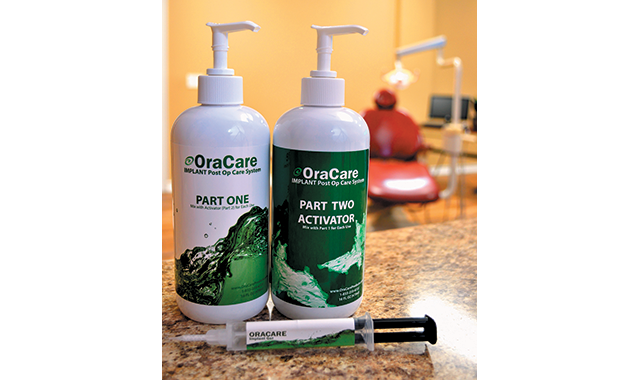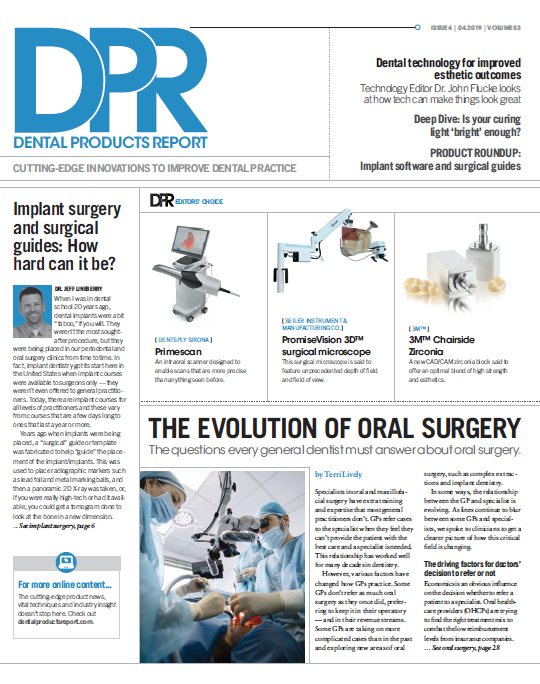Reducing the implant failure rate
How the OraCare Implant Post Op Care System helps to deliver positive outcomes.

Dental implants are somewhat of a miracle. In the past, edentulous patients had to rely on bridges or dentures to replace missing teeth. Implants changed all of that. But, like many miracles, it came with some strings attached.
First, implants are expensive. The cost of replacing a single tooth can range from $1,000 to $3,000. Second, failure rates hover around 10 percent. While it’s up to the market to bring costs down, mouth rinse manufacturer OraCare has developed a new system to combat implant loss due to peri-implantitis.
The need
“We came up with the product because we felt like there was a need,” says Robert Martino, DDS, CEO of OraCare. “The No. 1 reason implants fail is peri-implantitis.”
It can be easy to forget that implants are finicky and might not last.
Read more: How to solve the peri-implantitis problem
“Sometimes we put in an implant and think it’s going to stay forever,” Dr. Martino says. “An implant is not going to get cavities, but it can still get gum disease, and one of the reasons why we’re putting them in is because a lot of times people lost their teeth through gum disease and didn’t take great care.”
The OraCare Implant Post Op Care System combats two different issues on two different fronts.
“The first is right after the surgery, which is a time when you can get gum infection and when healing really needs to take place,” Dr. Martino says. “The tissue needs to heal up as soon as possible so that we can get bone integration.
The product that the doctor uses right after surgery is a gel.
“And then there’s a rinse that goes home with the patient for the next month and they rinse with this,” he adds. “The same ingredients are in both the gel and the rinse, which are activated chlorine dioxide, aloe vera and xylitol. These ingredients have been proven to kill bacteria and volatile sulfur compounds and they break up plaque.”
The silent problem
Implants do fail, but Dr. Martino notes that too many implantologists fail to acknowledge the issue.

“Ten percent of all dental implants fail, and when they fail, it’s a catastrophe,” Dr. Martino says. “You have to remove it and put bone in there. Before you can put another implant in, the bone has to heal and the implants have to integrate. So, it’s at least a year, if you have a failed implant, before you can put another implant in and restore it. That’s a year that the patient’s not happy. It’s costly. It’s your reputation.”
It’s important to realize that there are a number of variables involved in an implant’s success or failure. While the clinician can take steps to mitigate the variables under his or her control, others are harder to manage - specifically, what patients do or don’t do in terms of home care.
“If you put in enough implants, you’re going to have failures,” Dr. Martino says. “It has nothing to do with skill. It has everything to do with patients’ home care. The primary reason why they fail is peri-implantitis. Forty-seven percent of all implants have some form of peri-implantitis.”
Some of the problems, he says, are because of mixed messages about post-surgery implant care.
“There are different schools of thought on how to clean the implant,” Dr. Martino says. “Do you floss? Some say you should, some say you shouldn’t. There’s just a lot of misinformation out there. I don’t think we’re doing enough as a profession to take care of this problem.”
The patient
Most patients anticipate some sort of postoperative care regimen, and OraCare is an easy-to-use product that facilitates compliance.
Trending research: New discovery could reduce the implant failure rate
“I think they expect something like that,” Dr. Martino says. “And when we don’t give them something, that’s when they’re surprised. They just spent a couple thousand dollars on this implant, and then we send them home with nothing. You just put a foreign body in their mouth. They just had major surgery. There needs to be some kind of follow up, and they need to understand that they have to take care of this differently than they took care of their teeth.”
For some patients, poor oral hygiene was the impetus for needing dental implants. Providing a simple, easy-to-use home care regimen is critical to the surgery’s success.
“When you go to try to slow down bacteria and volatile sulfur compounds, you can’t just hit something once,” Dr. Martino explains. “You have to continue to do it. The body builds it back up. We’re hitting it with the gel, but then we are continuing it with the rinse.”
The breakthrough
OraCare’s mouth rinse has been available for more than seven years. The OraCare Implant Post Op Care System has been available for a little more than six months, thanks to a doctor’s observation.To enhance the products’ efficacy for implants, OraCare added aloe vera. The gel is three times stronger than the rinse.
Ultimately, the OraCare Implant Post Op Care System protects the implant’s health and the patient’s investment.
“It’s like peace of mind,” Dr. Martino says. “You spent all this money; this is a very expensive procedure. You spent a lot of time. It’s low-cost insurance.”

ACTIVA BioACTIVE Bulk Flow Marks Pulpdent’s First Major Product Release in 4 Years
December 12th 2024Next-generation bulk-fill dental restorative raises the standard of care for bulk-fill procedures by providing natural remineralization support, while also overcoming current bulk-fill limitations.